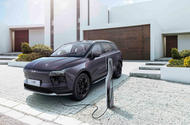Government halves assistance for EV buyers and doubles the range required to qualify for it ahead of 2020 discontinuation
The Chinese government has announced that it’s slashing subsidies on electric vehicles (EVs) before removing them entirely in 2020.
This has been done in an effort to get manufacturers to rely on technical innovation for success rather than financial assistance. The subsidies have helped China’s EV industry to grow rapidly to maturity in the past decade.
EVs must now have a range of at least 155 miles to qualify for any government subsidy, up from 93 miles previously.
In addition, the subsidy for those officially capable of more than 250 miles will be halved, from RMB 50,000 (currently £5626) to RMB 25,000 (£2813).
In China, official ranges for EVs are produced under the NEDC test cycle, which has now been superseded in Europe by WLTP due to its often unrealistic results. For example, the Nissan Leaf is rated at 235 miles NEDC and 168 miles WLTP – a decrease of 28.5%.
China’s finance ministry also has told local bodies to remove any incentives of their own. This could lead to overall help for consumers reducing by up to 67%.
While some Chinese car makers, such as BYD, state that they were prepared for the change, others have said they might have to increase their prices.
Bloomberg quotes a Bernstein analyst, Robin Zhu, as saying: “While the incumbent OEMs will see some earnings damage, we consider Nio the most vulnerable of all.
“Despite struggling for demand, the company recently indicated it won’t reduce prices to offset lower EV subsidies. Today’s subsidy cuts mean Nio’s cars just got meaningfully more expensive for consumers.”
There has been a strong drive towards electrification from the Chinese government as it looks to lessen its environmental impact. More than half of global EV sales are made in the country, which has the world’s largest overall automotive marketplace.
In 2018, the total number of EVs and hybrids sold there was 1.2 million. This was a year-on-year growth of 140%, despite the overall market dropping by 2.6%.
It’s predicted that there are currently more than 480 different EV-making companies in China, ranging from small-scale operations producing super-cheap microcars with lead acid batteries to global conglomerates such as Geely and the Volkswagen Group.
Source: Autocar
